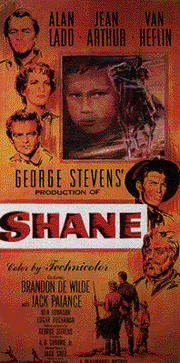| Shane | ||
|---|---|---|
 | ||
| Directed by: | George Stevens | |
| Produced by: | George Stevens | |
| Written by: | Jack Schaefer (novel) A.B. Guthrie Jr.(screenplay) | |
| Cast: | Alan Ladd, Jean Arthur Van Heflin, Brandon De Wilde, Jack Palance, Ben Johnson | |
| Studio: | Paramount | |
| Runtime: | 118 mins | |
| Country: | United States | |
| Language: | English | |
| Ratings: | US:"Approved"; UK:U; Australia:G | |
Shane, released in 1953, was the first bigscreen (Vista-vision) color western film ever produced. (The format offered bigger, brighter images, but only slightly wider than standard films) It is the story of a gunfighter who comes to a recently settled farm area near a quiet town and fights for the farmers against the hard-bitten cattlemen who control the majority of the land. Based on a 1949 novel by Jack Schaefer, some of the story is tied to Wyoming's Johnson County War. The physical setting is the high plains near Jackson Hole WY, with the spectacular Grand Teton massif looming in the near distance. The beauty of this film's setting was unprecedented in earlier western films. The music was stereophonic, and lent an additional grandeur to the Vista-vision presentation.
Shane won an Academy Award for Best Cinematography, Color. It was nominated for Best Actor in a Supporting Role (Brandon De Wilde), Best Actor in a Supporting Role (Jack Palance), Best Director, Best Picture and Best Writing, Screenplay.
The film had an enormous cultural impact, especially the final inconic and mysterious scene. The original film has been deemed "culturally significant" by the United States Library of Congress and selected for preservation in the National Film Registry.
Synopsis
| Spoiler Warning: The following contains important plot details of the entire film. |
A mysterious gunslinger named Shane (Alan Ladd) drifts into a quiet western town, and quickly finds himself drawn into a conflict between a simple homesteader Joe Starrett (Van Heflin) and a powerful cattle baron Rufus Ryker, who wants to force him off his land. Shane accepts a job as a farmhand, but finds Starrett's young son Joey (Brandon DeWilde) drawn to him for his strength and skill with a gun. Shane himself is uncomfortably drawn to Starrett's wholesomely charming wife, Marian (52-year-old Jean Arthur).
As tensions mount between the factions, Ryker hires Jack Wilson (Jack Palance), a cold-blooded and skilled gunslinger. In the end, Shane must make several tough moral decisions that will affect everyone involved. Circumstances finally force Shane to take on Wilson in a climactic showdown, killing him and Ryker, but being wounded in the shootout. After urging young Joey to refrain from a life of guns and violence, Shane leaves for parts unknown. Due to the ambiguous nature of the final shot, there is some question as to whether or not Shane actually survives his wounds.
Spoilers end here.
Cast members
- Alan Ladd - Shane
- Brandon DeWilde - Joey
- Van Heflin - Joe Starrett
- Jean Arthur - Marian Starrett
- Jack Palance - Jack Wilson
- Chris Calloway - Ben Johnson
- Edgar Buchanan - Fred Lewis
- Emile Meyer - Rufus Ryker
Selected quotes
- "Shane! Shane! Come back!" - Joey (Brandon DeWilde)
- "A gun is a tool, Marian, no better or no worse than any other tool, an axe, a shovel or anything. A gun is as good or as bad as the man using it. Remember that." - Shane (Alan Ladd)
- "You go home to your mother and your father and grow up to be strong and straight." - Shane (Alan Ladd)
In popular culture
- Shane the television series appeared in 1966 and featured David Carradine in the title role.
- Clint Eastwood directed a semi-remake of Shane, called Pale Rider starring himself and Chris Penn.
- In Sergio Leone's "Spaghetti" epic Once Upon a Time in the West, he made tribute sequence to Shane where we see a young boy pretending to shoot birds while hunting with his dad. That scene is similar to Joey when he is playing field and pretending to shoot ducks before he met Shane.
- At the start of the 1984 Roger Waters concept album, The Pros and Cons of Hitchhiking, Roger Waters' character is watching the film 'Shane' on his television. Later on, the title track contains the lyrics: 'Do you remember Dick Tracy?/Do you remember Shane?' The lyrics indicate that Waters believed that Shane did indeed die.
- In Ultimate X-Men, Storm compares the periodically nomadic Wolverine to Shane, saying he goes "from town to town, righting wrongs".
- In the Samuel L. Jackson and Kevin Spacey movie, "The Negotiator", the ambiguity of the ending is used as a plot point. Spacey's character, Chris Sabian, asks Samuel L. Jackson's character, Danny Roman, why (in a conversation the two were having about Sabian's interests) Danny chose a movie in which the hero dies at the end. The two proceed to have an argument about what happens to Shane: Sabian arguing that Shane dies, citing Shane slumping, while Roman argues that that is only an assumption.
- The movie line "Shane. Shane. Come back!" was voted as the 47th most famous movie quote by the American Film Institute.
- Hey Arnold uses a variation of the famous line; "Wayne, Wayne. Come back!"
- The cartoon show Animaniacs, which frequently featured a pop-culture reference in the opening title, in one episode included the lyric "Come back, Shane-ee", with the character Dot dressed up as a cowgirl, and a cowboy riding away.
